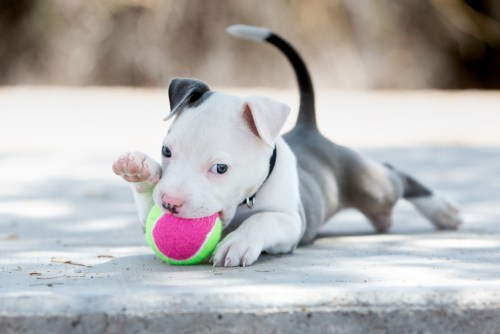
Contrary to popular belief — not to mention the pit bull’s reputation as a fearsome attack dog prone to turning on his owner — pits are typically gentle, affectionate dogs. According to Jennifer Lafountain, pit bulls aren’t actually a breed. Rather, they’re a mixture of five or six breeds, and they’re listed as a “terrier mix” on their adoption paperwork. Unfortunately, the stereotypes following pit bulls often mean that adoptions are rare. Pit bull adoption rates are frequently lower than most other breeds. October 23 is National Pit Bull Awareness Day, and we’re celebrating with a list of the top five reasons you should adopt a pit bull next.
1. Pit bulls love children
Don’t believe the myths: Pit bulls are no more likely to attack your children than any other breed. In fact, pit bulls were once nicknamed “the nanny breed” because of their fierce devotion to their family, particularly children. We believe there’s no such thing as a bad dog; there are only irresponsible owners who don’t know how to train a dog. Like any other dog, your pit bull will need obedience training. Children should be taught to be calm and gentle around dogs of any breed, and you shouldn’t leave any breed unattended with your child. The same holds true for pit bulls.
2. Pit bulls are relatively healthy
Like most mixed-breed dogs, pit bulls are generally healthier than purebred dogs. As a result of breeding to develop a specific set of characteristics, purebred dogs have a greater risk of inherited diseases and other health conditions like hip dysplasia. Due to their mixed genetics, pit bulls tend to have fewer health problems than other dogs. That’s not to say they aren’t at risk for common health problems, but it does mean there’s a somewhat reduced risk of your pit bull developing issues as he ages.
3. Pit bulls love to cuddle
Despite his tough-guy reputation, a pit bull is more likely to cuddle you than bite you. Pit bulls are one of the most devoted dogs, and they express their devotion by plastering themselves against you. If you take frequent trips, a pit bull might not be the best option for you. They enjoy bonding with their owners and may suffer from depression and separation anxiety if you spend a lot of time away from home. Most pit bulls also have short coats, so you should expect your pup to demand snuggle time when it’s cold outside. Lastly, like wolves and other dogs, pit bulls have a pack mentality, and you are their pack alpha. Just as wolves trust their pack alpha to lead them, your pit bull will look to you for guidance and affection.
4. Pit bulls don’t require too much grooming
We hate to disappoint you, but just like we feel compelled to bust negative myths associated with pit bulls, we have to dispel a positive myth, too. Regardless of what you might have heard, pit bulls do shed. Fortunately, they have short coats that don’t require haircuts, so you’ll save plenty of money on grooming expenses. Pit bulls are single-coated, which means they don’t have a dense undercoat as St. Bernards do. Dogs with double coats shed heavily twice a year in the spring and fall, but single-coated dogs shed small amounts year-round. Weekly brushing helps cut down on shedding and distributes your dog’s natural oils through his coat, leaving it glossy and healthy. Pit bulls tend to have sensitive skin, so if your pup gets dirty and needs a bath, look for a shampoo with gentle, nourishing ingredients like coconut oil, oatmeal, and aloe vera.
5. Pit bulls are sweet and playful
If you want a pup who’s capable of making you smile during even the darkest times, a pit bull is a great option. Known for their hilarious antics, loyalty, and sweet temperaments, pit bulls are ideal companions for anyone willing to overlook the stereotypes surrounding them. In fact, the American Temperament Test Society rated pit bulls as one of the most affectionate dogs, ranking higher than beagles and golden retrievers. Despite their size, pit bulls are perfectly content to crawl in your lap for a snuggle session. They’re often called “Velcro dogs” because they form such strong bonds with their pet parents.
Often maligned due to their use as fighting dogs by unscrupulous owners, pit bulls aren’t the vicious breed they’re portrayed to be in popular media. A pit bull is much more likely to attack you with kisses than with his teeth. You’ll need to train your pit bull, but that’s true no matter what breed you adopt. We hope you’ll consider welcoming one of these sweet, playful pups into your home.
Editors' Recommendations
- 5 reasons you really need to get a dog car seat
- 50 amazing boy dog names to consider for your new puppy
- The best medium-sized dog breeds for your family
- Does your dog drink a lot of water? Here’s when you should be concerned
- When can kittens eat dry food? The lowdown on what you should feed them